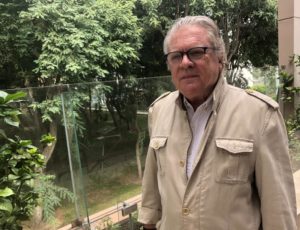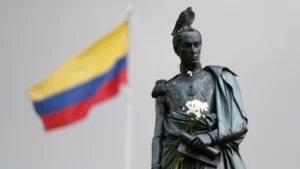While in a lesser scale than the chavista Twitter “tropa,” the hardcore anti-Chávez movement built a political space on social media using techniques common to antidemocratic forces
Publicado en: Caracas Chronicles
Por: Tony Frangie Mawad & Cristóbal Picón Ball
“Moisés Naím is one of [George] Soros’s globalist leftist agents,” tweeted Adriana Azzi, a Venezuelan astrologist catapulted to fame in the early 2000s for her magazine columns and an esoteric TV show that once had Nicolás Maduro and Leopoldo López as guests. “He’s focused on information and propaganda #PeopleOfTheCabal,” she wrote. The day before, in the midst of racial protests and the pandemic that defined the summer of 2020, Naím—a Venezuelan intellectual and former Minister of Development from 1989 to 1990—had published an article in El País, comparing Trump’s response to the pandemic to Bolsonaro and López Obrador’s.
Naím didn’t expect the digital outrage: a mob of accounts tweeted insults and QAnon and Plandemic conspiracy theories, to diminish his reputation. Worried by the sudden and aggressive backlash, Naím hired ProBox, a Venezuelan monitor organization that tracks ongoing debates and trends on Twitter. ProBox uses a criteria of 12 features to nail accounts that are likely to be fake, which includes whether they use a real name, their number of followers (trolls rarely surpass 1,500) and their ability to tweet at regular intervals (it’s probably a bot if the account tweets every 30 seconds or five minutes).
The results of ProBox’s study were telling: out of the 135 accounts negatively mentionioning Naím, 48 were part of their list of radical opposition accounts and four (8.33%) ticked at least six fake-account characteristics. “What’s delicate with the case of Adriana Azzi, for example, is the reach that people like her have,” says María Virginia Marín, the executive director of ProBox. “It’s unverified information positioned by anonymous networks of (some) possibly fake accounts that reach real people, who greatly expand and disseminate it afterwards.” Real accounts, like Azzi’s, were mixing with troll accounts like “Templario Resistencia” as part of the anti-Naím mob.
This isn’t an isolated event. The 2020 ProBox report revealed the amount of “inorganic” content—tweets likely generated by fake users, whether they’re trolls or bot accounts—produced by social and political actors in the country’s favorite social media channel. To pinpoint inorganic tweets from the opposition, ProBox divided the sources of their hashtags in three categories: the unitary opposition composed of the Caretaker Presidency of Juan Guaidó and the parliamentary coalition elected in 2015; the individual communications of opposition parties; and the radical opposition groups associated with demands for a foreign military intervention.
According to the report, 11.59% of the tweets using hashtags from the unitary opposition are inorganic. Opposition parties scored 19.11%, while pro-intervention users stood out with 26.99%. The radical opposition produced more tweets than Guaidó’s coalition, though the latter managed to spread more hashtags. The weighted rate of inorganic content from the opposition as a whole was 17.9%, a seemingly low figure compared to the regime’s part in the same period according to ProBox: 61.28%.
They might pop up during an election or smear campaign, and disappear and delete their tweets shortly after. We notice when this occurs, which shows there’s a sophisticated strategy that can complicate a holistic analysis.
And yet, the numbers might be higher. “Artificial intelligence is constantly changing,” Marín says, “and when there’s people managing these accounts, it’s far more difficult to identify fakes.” The people behind them might use tools like TweetDeck or Hootsuite to schedule content, presenting both real and robotized behaviours. But some human-managed accounts lack rhythmic patterns and can appear in specific moments, explains Marín. “They might pop up during an election or smear campaign, and disappear and delete their tweets shortly after. We notice when this occurs, which shows there’s a sophisticated strategy that can complicate a holistic analysis.”
Iria Puyosa, a political communications scholar specialized in information warfare, agrees that many fake accounts in Twitterzuela are people hired to express the line of a political party or organization rather than bots. “Such users present personalized patterns that make them harder to detect and remove than automated accounts (bots),” she says, “thus they last longer and are more productive and effective.” Some accounts present some of ProBox’s characteristics but not enough to be considered inorganic, meaning that the share of inorganic content could be higher but imperceptible by current methods.
The strange behavior around certain trending topics on Twitter can give some dim clues about human-managed troll accounts. For example, according to a ProBox report, the hashtag #TrumpGarantíaDeLibertad (#TrumpGuaranteeOfFreedom) was supported by 2,776 tweets and 366 users. If this amount is divided equally, it’d mean that each user tweeted the hashtag seven times, yet, only 0.26% of the 366 accounts fulfill six or more of the 12 characteristics that ProBox counts to identify fakes. Nevertheless, the unusual disparity between the hashtag’s dissemination, the number of accounts involved and the share of bots identified seem to indicate that fake accounts were being managed by real people pretending to act in organic ways.
Desert, Jungle, Bot
The proliferation of inorganic tweeting in Venezuela isn’t surprising. In 2016, Maduro decided to flood Twitter with an army of subsidized trolls that actively infiltrate conversations of dissidents and amplify propaganda in conjunction with a network of state programs, military groups and chavista leaders. The efficacy of this operation has been staggering: the regime amassed 84.3% of Twitterzuela’s conversation in 2020 with 114 million tweets, and 81.28% of the tweets using hashtags sponsored by the Ministry of Information—the spearhead of the chavista disinformation apparatus—came from fake accounts.
While chavismo has practically claimed the troll hegemony, the opposition has joined the game too, especially in its most radical sectors.
The efficacy of this operation has been staggering: the regime amassed 84.3% of Twitterzuela’s conversation in 2020 with 114 million tweets, and 81.28% of the tweets using hashtags sponsored by the Ministry of Information.
Vente Venezuela and its sympathizers are among the core members of the pro-intervention Twitter group, along with networks such as “Guerreros del Teclado” (Keyboard Warriors) and “Muro de Occidente” (Wall of the West), the latter echoing the struggle against socialism and communism, support for Donald Trump, calls for American military intervention and the accusations against Guaidó’s office, generating over three fifths of the trending topics positioned by the radical opposition between June and July. Their most popular hashtag was #VirusChino (Chinese Virus), with 91,200 tweets in March 2020. The conversation is further contaminated by tweets from radical opposition influencers, some of them close to Vente Venezuela, whose blended rhetoric of postmodern conservatism and American-made conspiracy theories is often amplified by anonymous troll accounts.
Radical opposition speech on Twitter has served to create “a small political niche” for that sector by giving it “a space of differentiation and a place in the discussion table,” says Puyosa. While it may not be a significant group demographically and it only obtained one seat in the 2015 legislative elections, Vente Venezuela and its allies have managed to attract more attention from the opposition’s leadership than older parties like La Causa R “that organically have more mobilization capacity in the country, having the workers in Guayana (from the Corporación Venezolana de Guayana and SIDOR) and a set of unions and neighborhood activists that generate constant street mobilizations,” says Puyosa. Vente Venezuela sympathizers are mostly on Twitter and aren’t generating much content on Facebook or Instagram. Puyosa believes they are reaching somewhere between 250,000 and 500,000 people, “a small echo chamber that seems to amplify what’s in that niche. Its real importance is limited but it’s been quite magnified by decision-makers (in the unitary opposition).”
A Tradition of Conspiracists
Chávez’s anti-imperialist instinct was outspokenly conspiratorial and pointed at absurd CIA plots, electric coups and cover-ups that were replicated by his followers and advisors, with Eva Golinger as a main voice. “Latin America has a long tradition of leftist discourses that are very theoretical–conspiratorial. It’s based on an anti-imperialist rhetoric,” says Hugo Pérez Hernáiz, a sociologist who monitors conspiratorial thinking in Venezuelan politics. “But it’s possible that now—in a period of crisis and trauma, with the pandemic and global polarization—there’s an exacerbation of conspiratorial rhetoric” because these theories “explain evil and point at culprits. This is satisfactory and gives certainty.”
Yet the new set of conspiracy theories on Venezuelan social media has nothing to do with the old anti-imperialist conspiracies of the far left but rather with a set of far-right conspiracy theories imported from the United States: QAnon, the MAP movement, Plandemic, Pizzagate, theories around George Soros and Open Society Foundations, the Deep State, etc.
After the U.S. elections, after everything that had to do with Trump ended, the (apparently inorganic) accounts disappeared and we haven’t seen any hashtags by these actors since.
“Conspiracy theories never come alone, they always belong to a constellation of conspiratorial rhetoric and have a cascade effect: one follows the other, which affirms and explains the previous one,” says Pérez Hernáiz, “that’s why I don’t find it surprising that the Venezuelan issue has related so well with QAnon and the other American theories.” For Pérez Hernáiz, Ángel García Banchs, a Twitter-famous economist, would be a poster child: “He’s full-fledged QAnon: Deep State, pedophiles, all of that. But it’s also adapted; why didn’t the U.S. military intervene in Venezuela? Because the whole caretaker government and the feeble opposition are part of the great conspiracy of the American elite and the Deep State, which is truly socialist and blah, blah, blah. It’s a hodgepodge.”
Within the radical opposition community, conspiracy theories helped to cope with the fact that Trump lost the 2020 election. Before American ballots were being counted, many of them joined the Americans prone to believe Trump’s claims that the presidential election would be rigged. Magazuelans on Twitter entered an obvious state of denial when the electoral college map began to turn blue and predicted the end of Trump’s incumbency, but hopes for a legal challenge (“who knows, maybe the Supreme Court will return Trump to the White House”) were high. A new conspiracy theory came to their rescue, from Rudy Giuliani and Sydney Powell: Dominion, the election technology company whose system was used in over 30 U.S. states, was owned by Smartmatic and used its softwares to delete or flip millions of votes cast for Trump. The story fit the belief that Smartmatic, used in 14 elections under Chávez and Maduro, helped chavismo in stealing elections and clinging to power, and was now plotting to topple their messiah and chavismo’s biggest (or perhaps only) threat. Smartmatic ceased operations in Venezuela after denouncing the CNE’s manipulation of turnout figures following the illegal ANC election in 2017. Four days after Powell’s infamous press conference that blamed the late Hugo Chávez as the mastermind of the supposed electoral fraud in the United States., Vente Venezuela leader María Corina Machado affirmed that Smartmatic’s system facilitated electronic fraud in Venezuela. “As a Venezuelan, if there’s one lesson I can pass on to every American, is that the defense of truth and the predominance of justice cannot be terminated, or dismissed, by excuses or arguments of any kind,” she said.
Regarding the unitary opposition, some have now borrowed conspiracy narratives from the radical Twitterzuela community for their own political communication ends, and Pérez Hernáiz holds that radical influencers “seem to have lots of influence over certain high profile politicians who get carried away.” Julio Borges, Guaidó’s Foreign Relations commissioner, tweeted in October 2019 that the periods of popular unrest in Chile and Ecuador were provoked by Maduro and the São Paulo Forum. Last summer, he accused Maduro of promoting violence and subversion in the U.S. during the racial protests—his sole piece of evidence was a picture of regime propagandist Max Blumenthal wearing a Chávez t-shirt at a Black Lives Matter rally in Washington, D.C.
The Miami Connection?
In the past two years, with Guaidó’s efforts to remove Maduro being backed by certain polarizing figures, radical opposition influencers may have conspicuously pushed the narratives of right-wing populists from abroad, akin to how Maduro’s disinformation tactics have fed from Russia, Iran and Turkey. The Institute for Strategic Dialogue, a London-based think tank, tracked 2,882 accounts that generated 4.4 million tweets supporting Spanish far-right party Vox and its leader Santiago Abascal in 2019. El País reported that the network initially targeted the Maduro regime and remained dormant for a while before reactivation in 2017, when it published islamophobic content after the terrorist attack in La Rambla, Barcelona. The network is linked with Alberto Franceschi, a Miami-based Venezuelan influencer who leads a pro-intervention and anti-Guaidó digital movement known as “Repúblicos”. Franceschi declined El País’s request for comment.
When opposition leaders target each other on social media, Puyosa asserts that the regime grows stronger by boosting pre-existing smear campaigns in an injured public sphere that brims with “accusations, delegitimization and distrust.
“After the U.S. elections, after everything that had to do with Trump ended, the (apparently inorganic) accounts disappeared and we haven’t seen any hashtags by these actors since,” says Marín, who’s sure that there was “some sort of attack coordination” coming from these accounts during the 2020 U.S. election campaign. “We also noticed a number of attacks against Ricardo Hausmann, Diego Scharifker and everyone (from Venezuela) who has ties or supported Biden, or opposed Trump.”
The Radical Convergence
Opposition networks may also back or attack figures from both the radical sector and the main opposition parties. The Stanford Internet Laboratory found last year that Facebook removed 55 accounts, 42 websites and 36 Instagram accounts attributed to the strategic communications firm CLS Strategies, known for its previous work with a wide array of governments, international organizations and companies. The CLS network targeted Venezuela but was mostly based in the United States (with a few branch locations in Venezuela, Peru and Ecuador) and originally promoted Guaidó, Machado and Henrique Capriles.
Yet, while originally endorsing Guaidó after his swear-in speech in January 2019, the network started to oppose him when Machado and Capriles became increasingly critical of his actions. AP News reported that Armando Briquet, a career politician from Primero Justicia close to Capriles, was a senior advisor at CLS, though he denied his involvement. The firm disputed Facebook’s claim of “foreign interference” in the region because all of its clients were locals from the targeted countries. The Stanford report also mentioned Venezuela-managed accounts that targeted Bolivia in support of Jeanine Áñez’s government.
When opposition leaders target each other on social media, Puyosa asserts that the regime grows stronger by boosting pre-existing smear campaigns in an injured public sphere that brims with “accusations, delegitimization and distrust, creating an abyss between support bases and leaderships that hinders organization of any kind, whether for popular mobilization or electoral events.” The essential premise of such campaigns, she says, is that opposition politicians are all useless, which in the end helps preserve the chavista status quo. “As this message pervades, disgruntled chavistas don’t look towards the opposition and opposition bases step away from party leaders, which helps the ruling party stay in power despite the marginal approval ratings and ideological support they have nowadays.”
Puyosa’s study “Venezuelan Government Strategies for Information War on Twitter” found that the regime’s accounts pretend to act as extremist opposition users that promote violence and insults in order to polarize debate and demobilize citizens. “We can use the example of how people evaluate the risk of protest,” says Puyosa. “When there are calls to protest and there’s this type of incendiary messages, the common citizen says ‘this is going to get bad, I better not go.’”
But according to Marín, many hashtags and topics that are positioned on social media (organically or not) are then reproduced almost in the same form by both the radical opposition and chavismo, or chavismo pretending to be opposition extremists. “Sometimes the narratives converge,” she says. February saw a string of personal attacks coming from radical opposition accounts against Leopoldo López on Twitter. “The attacks were replicated almost identically on (Diosdado Cabello’s TV show) Con El Mazo Dando,” says Marín.
Meanwhile, in a digital landscape polluted by organized trolls and bots of every color, ProBox expects to soon develop new metholodogies and tools to “identify other types of fake accounts that aren’t just chavista, which are the most evident and the ones we have documented the most, with random content, a bunch of hashtags and names like @MiPatriaBellaPorSiempre1958,” says Marín.
“Disinformation is state policy in Venezuela,” she says. “This isn’t perceived as a real problem because we have others that are more serious. But considering the level of censorship and the more than five million Venezuelans abroad, this is a space for free speech that we cannot lose and need to decontaminate. We must pressure Twitter to eliminate these accounts: as citizens, as civil society and as institutions.”















